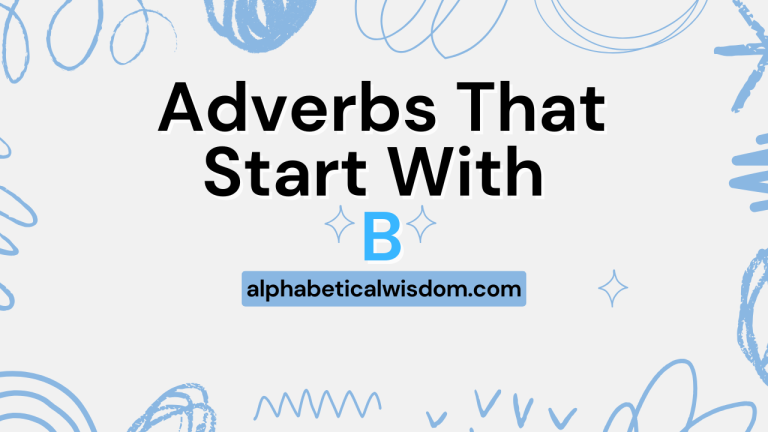Adverbs That Start With H: A Comprehensive Grammar Guide
Adverbs are essential components of the English language, enriching sentences by providing additional information about verbs, adjectives, or other adverbs. Focusing on adverbs that begin with the letter “H” is not just a linguistic exercise; it enhances vocabulary and improves the precision and clarity of writing.
This article is designed for English language learners, writers, and anyone interested in mastering the nuances of English grammar. By exploring the diverse range of “H” adverbs, readers will gain a deeper understanding of how these words function and how to use them effectively to add depth and detail to their communication.
Table of Contents
- Introduction
- Definition of Adverbs
- Structural Breakdown of Adverbs
- Types of Adverbs Starting With “H”
- Examples of Adverbs Starting With “H”
- Usage Rules for Adverbs Starting With “H”
- Common Mistakes When Using Adverbs Starting With “H”
- Practice Exercises
- Advanced Topics
- Frequently Asked Questions (FAQ)
- Conclusion
Definition of Adverbs
An adverb is a word that modifies a verb, an adjective, another adverb, a phrase, or a clause. Adverbs provide information about how, when, where, and to what extent an action is performed.
They add detail and specificity to sentences, making them more descriptive and engaging.
Classification of Adverbs
Adverbs can be classified based on their function. Common categories include adverbs of manner, adverbs of time, adverbs of place, adverbs of degree, and adverbs of frequency.
Each category answers a specific question about the action or description in a sentence.
- Adverbs of Manner: Describe how an action is performed (e.g., quickly, slowly, carefully).
- Adverbs of Time: Indicate when an action occurs (e.g., yesterday, now, soon).
- Adverbs of Place: Specify where an action takes place (e.g., here, there, everywhere).
- Adverbs of Degree: Show the extent or intensity of an action or quality (e.g., very, extremely, slightly).
- Adverbs of Frequency: Indicate how often an action occurs (e.g., always, often, rarely).
Function of Adverbs
Adverbs serve various functions in a sentence. They can modify verbs, adjectives, or other adverbs.
Understanding these functions is crucial for using adverbs correctly and effectively. For example, in the sentence “She sings beautifully,” the adverb “beautifully” modifies the verb “sings.” In the sentence “It is an extremely hot day,” the adverb “extremely” modifies the adjective “hot.” And in the sentence “He runs very quickly,” the adverb “very” modifies the adverb “quickly.”
Contexts for Using Adverbs
Adverbs are used in various contexts to provide additional information and detail. They are essential in descriptive writing, narrative storytelling, and persuasive arguments.
The choice of adverb can significantly impact the tone and meaning of a sentence. For example, using “happily” instead of “sadly” can completely change the emotional impact of a description.
Structural Breakdown of Adverbs
The structure of adverbs can vary depending on their type and origin. Many adverbs are formed by adding the suffix “-ly” to an adjective, but not all adverbs follow this pattern.
Some adverbs are single words, while others are phrases.
Formation of Adverbs
Many adverbs are formed by adding the suffix “-ly” to an adjective. For example, “quick” becomes “quickly,” and “happy” becomes “happily.” However, some words that end in “-ly” are adjectives (e.g., “friendly,” “lovely”).
It’s important to understand the function of the word in the sentence to determine whether it’s an adverb or an adjective.
Single-Word Adverbs
Single-word adverbs are independent words that function as adverbs without any additional suffixes or modifications. Examples include “here,” “there,” “now,” “then,” and many others.
These adverbs are often used to indicate time, place, or manner.
Adverbial Phrases
Adverbial phrases are groups of words that function as adverbs. They can consist of prepositional phrases (e.g., “in the morning,” “at the park”) or other types of phrases that modify verbs, adjectives, or other adverbs.
Adverbial phrases provide more detailed information than single-word adverbs.
Types of Adverbs Starting With “H”
Adverbs starting with “H” can be categorized based on their function, similar to all adverbs. This section will explore common types of “H” adverbs and provide examples of each.
Adverbs of Manner Starting With “H”
Adverbs of manner describe how an action is performed. Examples of adverbs of manner starting with “H” include “happily,” “hard,” “hastily,” “honestly,” and “handsomely.”
Adverbs of Time Starting With “H”
Adverbs of time indicate when an action occurs. Examples of adverbs of time starting with “H” are less common, but “hence” and “hourly” can function as adverbs of time in certain contexts.
Adverbs of Degree Starting With “H”
Adverbs of degree show the intensity or extent of an action or quality. Examples of adverbs of degree starting with “H” include “highly” and, in some contexts, “hardly.”
Adverbs of Frequency Starting With “H”
Adverbs of frequency indicate how often an action occurs. While not strictly adverbs of frequency, words like “half” can function adverbially to indicate frequency or degree.
Examples of Adverbs Starting With “H”
This section provides extensive examples of adverbs starting with “H” used in various contexts. Understanding how these adverbs function in sentences is crucial for effective communication.
Examples of ‘Happily’
The adverb “happily” describes an action done with joy or pleasure.
| Sentence | Explanation |
|---|---|
| She sang happily. | “Happily” modifies the verb “sang,” indicating the manner of singing. |
| They lived happily ever after. | “Happily” modifies the verb “lived,” describing the state of their life. |
| He accepted the gift happily. | “Happily” modifies the verb “accepted,” showing his joyful acceptance. |
| The children played happily in the park. | “Happily” describes how the children played. |
| She smiled happily at the news. | “Happily” modifies the verb “smiled,” indicating the manner of smiling. |
| They worked happily together on the project. | “Happily” modifies the verb “worked,” describing the state of their work. |
| He greeted his friend happily. | “Happily” modifies the verb “greeted,” showing his joyful greeting. |
| The couple danced happily at their wedding. | “Happily” describes how the couple danced. |
| She finished her exam happily. | “Happily” modifies the verb “finished,” indicating the manner of finishing. |
| They celebrated their victory happily. | “Happily” describes how they celebrated. |
| He watched the sunset happily. | “Happily” modifies the verb “watched,” showing his joyful watching. |
| The students studied happily for the test. | “Happily” describes how the students studied. |
| She prepared the meal happily. | “Happily” modifies the verb “prepared,” indicating the manner of preparing. |
| They traveled happily to their destination. | “Happily” describes how they traveled. |
| He listened to the music happily. | “Happily” modifies the verb “listened,” showing his joyful listening. |
| The team practiced happily for the game. | “Happily” describes how the team practiced. |
| She read the book happily. | “Happily” modifies the verb “read,” indicating the manner of reading. |
| They relaxed happily on the beach. | “Happily” describes how they relaxed. |
| He painted the picture happily. | “Happily” modifies the verb “painted,” showing his joyful painting. |
| The audience applauded happily after the performance. | “Happily” describes how the audience applauded. |
| She announced the good news happily. | “Happily” modifies the verb “announced,” indicating the manner of announcing. |
| They reminisced happily about their childhood. | “Happily” describes how they reminisced. |
| He anticipated the vacation happily. | “Happily” modifies the verb “anticipated,” showing his joyful anticipation. |
| The community celebrated the festival happily. | “Happily” describes how the community celebrated. |
Examples of ‘Hard’
The adverb “hard” describes an action done with great effort or intensity. It can also mean “with difficulty.”
| Sentence | Explanation |
|---|---|
| He worked hard to achieve his goals. | “Hard” modifies the verb “worked,” indicating the intensity of his work. |
| She tried hard to understand the concept. | “Hard” modifies the verb “tried,” showing her effort. |
| It rained hard all night. | “Hard” modifies the verb “rained,” indicating the intensity of the rain. |
| He studied hard for the exam. | “Hard” describes how he studied. |
| She pushed hard to open the door. | “Hard” modifies the verb “pushed,” indicating the intensity of her push. |
| They fought hard for their rights. | “Hard” describes how they fought. |
| He thought hard about the problem. | “Hard” modifies the verb “thought,” indicating the intensity of his thinking. |
| She practiced hard to improve her skills. | “Hard” describes how she practiced. |
| They negotiated hard to reach an agreement. | “Hard” modifies the verb “negotiated,” indicating the intensity of their negotiation. |
| He trained hard for the marathon. | “Hard” describes how he trained. |
| She concentrated hard on the task. | “Hard” modifies the verb “concentrated,” indicating the intensity of her concentration. |
| They competed hard in the tournament. | “Hard” describes how they competed. |
| He listened hard to the instructions. | “Hard” modifies the verb “listened,” indicating the intensity of his listening. |
| She persevered hard despite the challenges. | “Hard” describes how she persevered. |
| They struggled hard to make ends meet. | “Hard” modifies the verb “struggled,” indicating the intensity of their struggle. |
| He researched hard to find the information. | “Hard” describes how he researched. |
| She worked hard to complete the project on time. | “Hard” modifies the verb “worked,” indicating the intensity of her work. |
| They labored hard to build the house. | “Hard” describes how they labored. |
| He strived hard to achieve his dreams. | “Hard” modifies the verb “strived,” indicating the intensity of his striving. |
| She toiled hard to provide for her family. | “Hard” describes how she toiled. |
| They pressed hard for the reforms. | “Hard” modifies the verb “pressed,” indicating the intensity of their pressing. |
| He fought hard to overcome his fears. | “Hard” describes how he fought. |
| She tried hard to stay positive. | “Hard” modifies the verb “tried,” indicating the intensity of her trying. |
| They pushed hard to meet the deadline. | “Hard” describes how they pushed. |
Examples of ‘Highly’
The adverb “highly” indicates a great degree or level.
| Sentence | Explanation |
|---|---|
| She is a highly respected doctor. | “Highly” modifies the adjective “respected,” indicating the degree of respect. |
| The project was highly successful. | “Highly” modifies the adjective “successful,” indicating the degree of success. |
| He is highly skilled in his profession. | “Highly” modifies the adjective “skilled,” indicating the level of skill. |
| The book is highly recommended. | “Highly” modifies the verb “recommended”, indicating the degree of recommendation. |
| She is a highly motivated student. | “Highly” modifies the adjective “motivated,” indicating the degree of motivation. |
| The company is highly profitable. | “Highly” modifies the adjective “profitable,” indicating the degree of profitability. |
| He is a highly regarded artist. | “Highly” modifies the adjective “regarded,” indicating the degree of regard. |
| The product is highly effective. | “Highly” modifies the adjective “effective,” indicating the degree of effectiveness. |
| She is a highly qualified candidate. | “Highly” modifies the adjective “qualified,” indicating the degree of qualification. |
| The research is highly significant. | “Highly” modifies the adjective “significant,” indicating the degree of significance. |
| He is a highly experienced engineer. | “Highly” modifies the adjective “experienced,” indicating the degree of experience. |
| The technology is highly advanced. | “Highly” modifies the adjective “advanced,” indicating the degree of advancement. |
| She is a highly talented musician. | “Highly” modifies the adjective “talented,” indicating the degree of talent. |
| The software is highly reliable. | “Highly” modifies the adjective “reliable,” indicating the degree of reliability. |
| He is a highly influential leader. | “Highly” modifies the adjective “influential,” indicating the degree of influence. |
| The strategy is highly innovative. | “Highly” modifies the adjective “innovative,” indicating the degree of innovation. |
| She is a highly creative designer. | “Highly” modifies the adjective “creative,” indicating the degree of creativity. |
| The system is highly efficient. | “Highly” modifies the adjective “efficient,” indicating the degree of efficiency. |
| He is a highly respected professor. | “Highly” modifies the adjective “respected,” indicating the degree of respect. |
| The investment is highly risky. | “Highly” modifies the adjective “risky,” indicating the degree of risk. |
Examples of ‘Honestly’
The adverb “honestly” means in a truthful or sincere manner.
| Sentence | Explanation |
|---|---|
| She honestly admitted her mistake. | “Honestly” modifies the verb “admitted,” indicating the manner of her admission. |
| He answered the question honestly. | “Honestly” modifies the verb “answered,” showing his sincerity. |
| Honestly, I didn’t know. | “Honestly” is used as a sentence adverb, emphasizing the truthfulness of the statement. |
| She spoke honestly about her feelings. | “Honestly” modifies the verb “spoke.” |
| He behaved honestly throughout the investigation. | “Honestly” modifies the verb “behaved.” |
| Honestly, I think you’re wrong. | “Honestly” emphasizes the truthfulness of the speaker’s opinion. |
| She answered honestly to the judge. | “Honestly” modifies the verb “answered.” |
| He expressed his opinion honestly. | “Honestly” modifies the verb “expressed.” |
| Honestly, I don’t understand. | “Honestly” emphasizes the speaker’s lack of understanding. |
| She reflected honestly on her past actions. | “Honestly” modifies the verb “reflected.” |
| He communicated honestly with his team. | “Honestly” modifies the verb “communicated.” |
| Honestly, I’m not sure what to do. | “Honestly” emphasizes the speaker’s uncertainty. |
| She approached the situation honestly. | “Honestly” modifies the verb “approached.” |
| He presented the data honestly. | “Honestly” modifies the verb “presented.” |
| Honestly, I appreciate your help. | “Honestly” emphasizes the speaker’s appreciation. |
| She evaluated the proposal honestly. | “Honestly” modifies the verb “evaluated.” |
| He shared his thoughts honestly. | “Honestly” modifies the verb “shared.” |
| Honestly, I have no idea. | “Honestly” emphasizes the speaker’s lack of knowledge. |
| She responded honestly to the inquiry. | “Honestly” modifies the verb “responded.” |
| He addressed the issue honestly. | “Honestly” modifies the verb “addressed.” |
Usage Rules for Adverbs Starting With “H”
Using adverbs correctly involves understanding their function and placement in a sentence. Adverbs can modify verbs, adjectives, or other adverbs, and their position can affect the meaning and emphasis of the sentence.
Placement of Adverbs
The placement of adverbs depends on the type of adverb and the element it modifies. Adverbs of manner are often placed after the verb they modify or after the object if there is one.
Adverbs of time and place can be placed at the beginning or end of a sentence. Adverbs of degree are usually placed before the adjective or adverb they modify.
Adverb Order
When using multiple adverbs in a sentence, follow a general order: manner, place, and time (MPT). For example, “She sang beautifully in the concert hall last night.” However, this order can be adjusted for emphasis or clarity.
Avoiding Misplaced Modifiers
A misplaced modifier is an adverb or phrase that is incorrectly placed in a sentence, causing confusion or unintended meaning. To avoid misplaced modifiers, ensure that the adverb is placed as close as possible to the word it modifies.
For example, “He nearly ate the whole pizza” is different from “Nearly he ate the whole pizza.”
Common Mistakes When Using Adverbs Starting With “H”
Even experienced English speakers sometimes make mistakes when using adverbs. This section highlights some common errors and provides correct examples.
Confusing Adjectives and Adverbs
One common mistake is using an adjective instead of an adverb or vice versa. Remember that adverbs typically modify verbs, adjectives, or other adverbs, while adjectives modify nouns.
| Incorrect | Correct | Explanation |
|---|---|---|
| He runs quick. | He runs quickly. | “Quickly” is the adverb that modifies the verb “runs.” |
| She is a happily person. | She is a happy person. | “Happy” is the adjective that modifies the noun “person.” |
Misplacing Adverbs
Misplacing an adverb can change the meaning of a sentence. Ensure that the adverb is placed as close as possible to the word it modifies.
| Incorrect | Correct | Explanation |
|---|---|---|
| Only I saw the movie yesterday. | I only saw the movie yesterday. | The first sentence implies that no one else saw the movie. The second sentence implies that I did not do anything else with the movie yesterday. |
| She almost ate the entire cake. | She ate almost the entire cake. | The first sentence implies that she didn’t quite eat the cake. The second sentence says she ate most of it. |
Overusing Adverbs
While adverbs can add detail and specificity to writing, overusing them can make sentences clunky and unnecessary. Choose adverbs carefully and use them only when they add significant meaning.
| Overly Descriptive | Concise | Explanation |
|---|---|---|
| He walked very slowly down the street. | He strolled down the street. | The verb “strolled” implies a slow and leisurely pace, making the adverb “very slowly” redundant. |
| She spoke very loudly during the presentation. | She shouted during the presentation. | The verb “shouted” implies a loud volume, making the adverb “very loudly” redundant. |
Practice Exercises
Test your understanding of adverbs starting with “H” with these practice exercises. Fill in the blanks with the appropriate adverb from the list provided (happily, hard, highly, honestly, hastily).
Exercise 1
| Question | Answer |
|---|---|
| 1. She ______ accepted the award. | happily |
| 2. He worked ______ to complete the project on time. | hard |
| 3. The professor was ______ regarded in his field. | highly |
| 4. ______, I didn’t expect to win. | Honestly |
| 5. She ______ packed her bags and left. | hastily |
| 6. They lived ______ ever after. | happily |
| 7. He tried ______ to solve the problem. | hard |
| 8. The recommended book is ______ praised. | highly |
| 9. _______, I have no idea what you’re talking about. | Honestly |
| 10. She wrote the letter ______ without proofreading it. | hastily |
Exercise 2
Rewrite the following sentences using an adverb starting with “H” to add more detail.
| Question | Answer |
|---|---|
| 1. She sang with joy. (Use “happily”) | She sang happily. |
| 2. He studied with great effort. (Use “hard”) | He studied hard. |
| 3. The respected doctor is well-known. (Use “highly”) | The doctor is highly respected. |
| 4. I am telling the truth, I didn’t know. (Use “honestly”) | Honestly, I didn’t know. |
| 5. She left in a rush. (Use “hastily”) | She left hastily. |
| 6. They celebrated with joy. (Use “happily”) | They celebrated happily. |
| 7. He trained with dedication. (Use “hard”) | He trained hard. |
| 8. The skilled worker is very valued. (Use “highly”) | The worker is highly skilled. |
| 9. I am telling the truth, I don’t agree. (Use “honestly”) | Honestly, I don’t agree. |
| 10. She made the decision in hurry. (Use “hastily”) | She made the decision hastily. |
Advanced Topics
For advanced learners, this section explores more complex aspects of adverbs starting with “H,” including their use in idiomatic expressions and nuanced contexts.
Adverbs in Idiomatic Expressions
Adverbs are often used in idiomatic expressions, where their meaning may differ from their literal definition. Understanding these expressions requires familiarity with their specific usage.
Nuanced Contexts
The meaning and impact of adverbs can vary depending on the context. Subtle differences in phrasing and sentence structure can influence the interpretation of adverbs starting with “H.”
Frequently Asked Questions (FAQ)
- What is the difference between an adjective and an adverb?
Adjectives modify nouns, while adverbs modify verbs, adjectives, or other adverbs. Adjectives describe the qualities of a noun (e.g., a happy dog), whereas adverbs describe how, when, where, or to what extent something is done (e.g., the dog barks loudly).
- How do I form an adverb from an adjective?
Many adverbs are formed by adding the suffix “-ly” to an adjective. However, there are exceptions, and some words that end in “-ly” are actually adjectives (e.g., friendly, lovely). It’s important to identify the function of the word in the sentence to determine whether it’s an adverb or an adjective.
- Where should I place an adverb in a sentence?
The placement of an adverb depends on the type of adverb and the element it modifies. Adverbs of manner are often placed after the verb they modify. Adverbs of time and place can be placed at the beginning or end of a sentence. Adverbs of degree are usually placed before the adjective or adverb they modify.
- Can an adverb modify an entire sentence?
Yes, some adverbs, known as sentence adverbs, can modify an entire sentence. These adverbs express the speaker’s attitude or opinion about the information being conveyed (e.g., Honestly, I didn’t know that.).
- What is a misplaced modifier, and how can I avoid it?
A misplaced modifier is an adverb or phrase that is incorrectly placed in a sentence, causing confusion or unintended meaning. To avoid misplaced modifiers, ensure that the adverb is placed as close as possible to the word it modifies.
- Are there any adverbs that don’t end in “-ly”?
Yes, many adverbs do not end in “-ly.” Examples include “here,” “there,” “now,” “then,” “hard,” and “fast.” These adverbs are often single-word adverbs that indicate time, place, or manner.
- How can I improve my use of adverbs in writing?
To improve your use of adverbs, pay attention to their function and placement in sentences. Read widely and observe how skilled writers use adverbs to add detail and nuance to their writing. Practice using adverbs in your own writing and seek feedback from others.
- What is the order of adverbs when using multiple adverbs in a sentence?
When using multiple adverbs in a sentence, follow a general order: manner, place, and time (MPT). For example, “She sang beautifully in the concert hall last night.” However, this order can be adjusted for emphasis or clarity.
- Is it possible to overuse adverbs?
Yes, while adverbs can add detail, overusing them can make sentences clunky and unnecessary. Choose adverbs carefully and use them only when they add significant meaning. Sometimes, a stronger verb can replace an adverb-verb combination for more concise writing.
- Can “hardly” be used as an adverb of degree?
Yes, “hardly” can function as an adverb of degree, indicating a minimal amount or degree. For example, “I hardly know him” means “I barely know him.”
Conclusion
Mastering adverbs, particularly those starting with the letter “H,” is a valuable step toward enhancing your English language skills. Understanding the nuances of adverbs such as “happily,” “hard,” “highly,” “honestly,” and “hastily” allows for more precise and descriptive communication.
By recognizing the different types of adverbs, their functions, and proper placement within sentences, you can significantly improve the clarity and impact of your writing and speaking.
Continue to practice using these adverbs in various contexts to solidify your understanding. Pay attention to how native English speakers use adverbs and seek opportunities to incorporate them into your own language use.
With consistent effort and attention to detail, you can confidently and effectively use adverbs starting with “H” to express yourself with greater accuracy and expressiveness.






